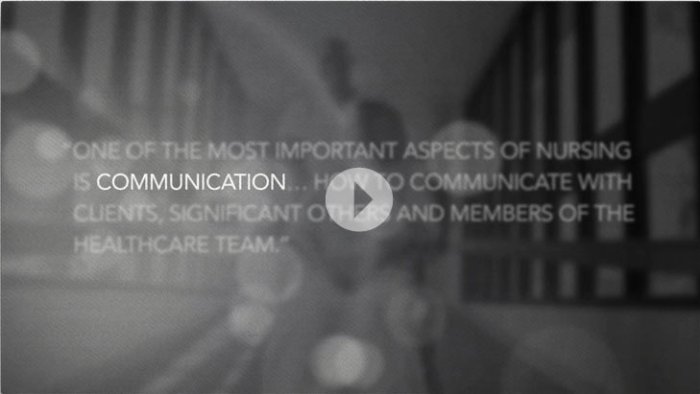ATI nurses touch professional communication is a critical aspect of patient care, enabling nurses to effectively convey information, build rapport, and provide comfort. This article explores the importance of effective communication and touch techniques for ATI nurses, discussing challenges, ethical considerations, and strategies to enhance patient outcomes.
Effective communication involves utilizing verbal and non-verbal cues to convey information clearly and respectfully. Active listening, empathy, and rapport-building techniques are essential for establishing trust and understanding with patients.
Professional Communication for ATI Nurses
Effective communication is crucial for ATI nurses to provide optimal patient care. It enables them to convey information clearly, build rapport with patients and their families, and foster a positive and therapeutic environment. Examples of effective communication include using clear and concise language, actively listening to patients’ concerns, and demonstrating empathy.
Ineffective communication, on the other hand, can lead to misunderstandings, misinterpretations, and compromised patient care. Barriers to effective communication for ATI nurses may include language differences, cultural beliefs, and personal biases.
Challenges and Barriers to Effective Communication for ATI Nurses
ATI nurses face various challenges and barriers to effective communication, including:
- Language differences: Patients may speak different languages, requiring interpreters or translators to facilitate communication.
- Cultural beliefs: Cultural differences can influence communication styles, nonverbal cues, and the interpretation of information.
- Personal biases: Nurses’ personal biases and assumptions can affect their communication with patients, potentially leading to misunderstandings or judgment.
Touch Techniques for ATI Nurses

Touch is a powerful communication tool that can enhance the patient-nurse relationship and provide comfort and support. ATI nurses use various touch techniques, including:
- Therapeutic touch: A gentle, non-invasive touch used to promote relaxation, reduce stress, and alleviate pain.
- Massage: A technique involving the manipulation of soft tissues to promote relaxation, improve circulation, and relieve muscle tension.
- Light touch: A gentle touch used to provide comfort, reassurance, and a sense of connection.
Each touch technique has its own benefits and limitations, and ATI nurses must consider the patient’s preferences, cultural beliefs, and medical condition when using touch.
Ethical Considerations Related to Touch in ATI Nursing, Ati nurses touch professional communication
The use of touch in ATI nursing raises ethical considerations, including:
- Consent: Patients must always provide informed consent before any touch is initiated.
- Boundaries: Nurses must respect patients’ personal space and avoid any touch that may be perceived as inappropriate or intrusive.
- Cultural sensitivity: Nurses must be aware of cultural differences in attitudes towards touch and adjust their approach accordingly.
Touch and Communication in ATI Nursing

Touch and communication are closely intertwined in ATI nursing. Touch can enhance communication by:
- Providing comfort and reassurance: A gentle touch can convey empathy, support, and a sense of connection.
- Facilitating nonverbal communication: Touch can convey emotions and intentions that may be difficult to express verbally.
- Breaking down barriers: Touch can help to overcome communication barriers caused by language differences or cultural beliefs.
However, touch can also hinder communication if it is used inappropriately or without the patient’s consent.
Examples of How ATI Nurses Can Use Touch to Improve Patient Care
ATI nurses can use touch to improve patient care in various ways, including:
- Providing comfort during painful procedures: A gentle touch can help to reduce anxiety and discomfort during painful procedures such as injections or wound care.
- Promoting relaxation and sleep: Therapeutic touch can help to promote relaxation and improve sleep quality in patients with chronic pain or anxiety.
- Building rapport and trust: Touch can help to build rapport and trust between nurses and patients, fostering a positive and therapeutic relationship.
Communication Strategies for ATI Nurses

Effective communication strategies are essential for ATI nurses to build rapport with patients and provide optimal care. These strategies include:
- Using clear and concise language: Nurses should use language that is easy to understand and avoid medical jargon or technical terms.
- Active listening: Nurses should listen attentively to patients’ concerns and demonstrate that they are actively engaged in the conversation.
- Empathy: Nurses should strive to understand patients’ perspectives and emotions, and respond with empathy and compassion.
Verbal communication is complemented by nonverbal communication, which includes:
- Eye contact: Maintaining eye contact conveys interest, attention, and respect.
- Body language: Open and relaxed body language conveys approachability and trust.
- Facial expressions: Facial expressions can convey emotions and intentions, and should be used to reinforce verbal communication.
Communication Training for ATI Nurses: Ati Nurses Touch Professional Communication
Communication training is essential for ATI nurses to develop and enhance their communication skills. Different types of communication training programs are available, including:
- Workshops: Workshops provide an opportunity for nurses to learn and practice communication skills in a structured environment.
- Online courses: Online courses offer flexibility and allow nurses to learn at their own pace.
- Mentoring programs: Mentoring programs pair experienced nurses with new nurses to provide guidance and support in developing communication skills.
Communication training benefits ATI nurses and their patients by:
- Improving patient satisfaction: Effective communication can lead to increased patient satisfaction and improved outcomes.
- Reducing medical errors: Clear and concise communication can help to reduce medical errors and improve patient safety.
- Fostering a positive work environment: Effective communication among nurses and other healthcare professionals can foster a positive and collaborative work environment.
Clarifying Questions
What are the benefits of touch in ATI nursing?
Touch can provide comfort, reduce anxiety, promote relaxation, and facilitate healing.
What are the ethical considerations related to touch in ATI nursing?
Nurses must obtain consent before touching patients, respect patient boundaries, and avoid using touch for personal gratification.
How can ATI nurses improve their communication skills?
Nurses can improve their communication skills through training programs, practice, and feedback from colleagues and patients.